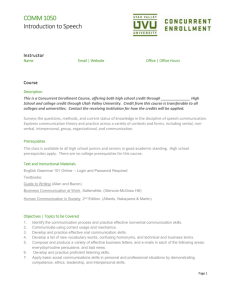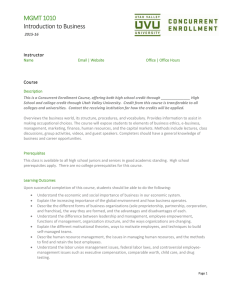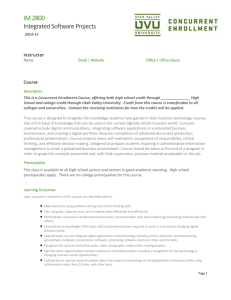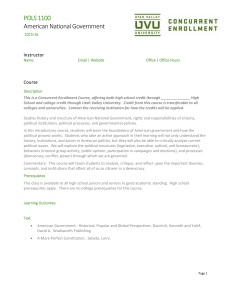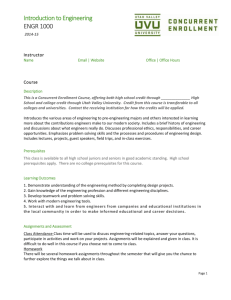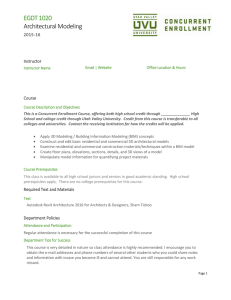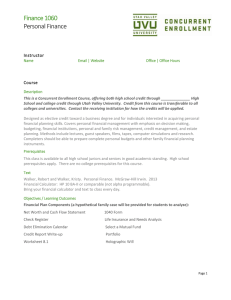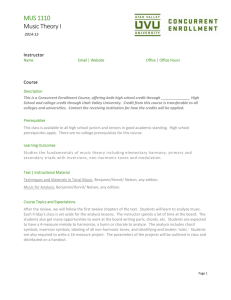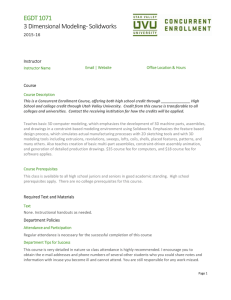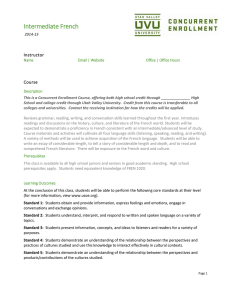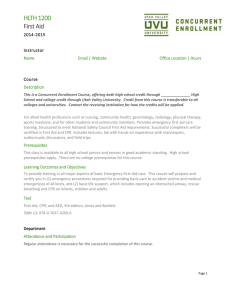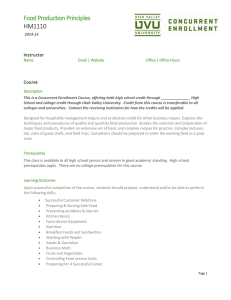PSY 1100 Human Development
advertisement
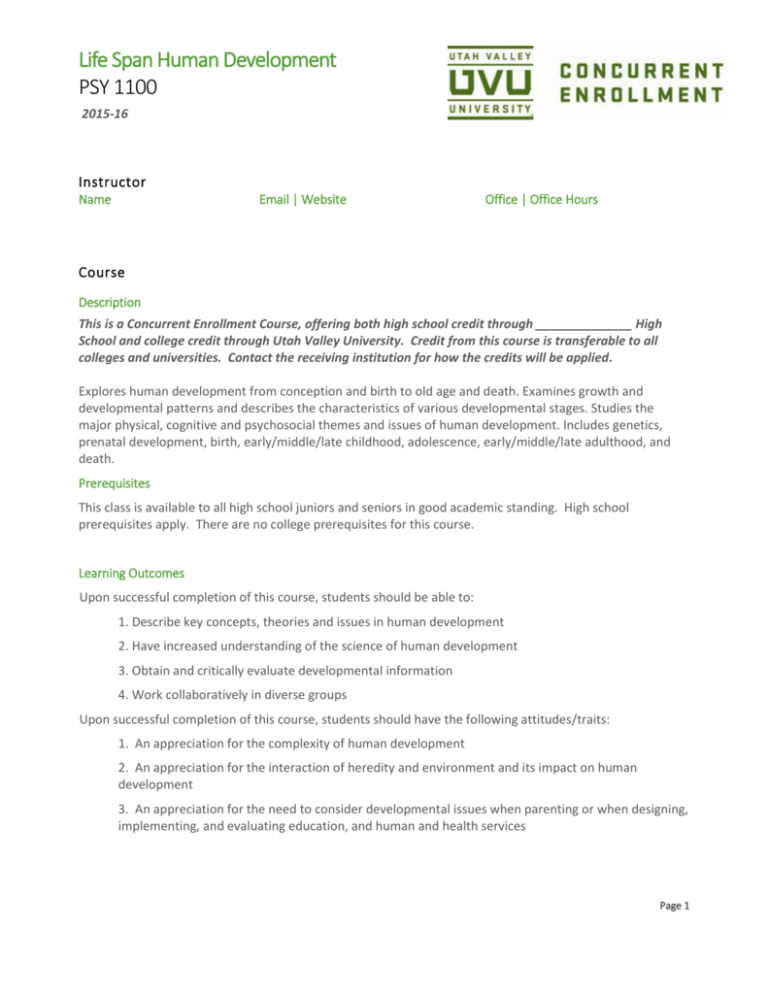
Life Span Human Development PSY 1100 2015-16 Instructor Name Email | Website Office | Office Hours Course Description This is a Concurrent Enrollment Course, offering both high school credit through ______________ High School and college credit through Utah Valley University. Credit from this course is transferable to all colleges and universities. Contact the receiving institution for how the credits will be applied. Explores human development from conception and birth to old age and death. Examines growth and developmental patterns and describes the characteristics of various developmental stages. Studies the major physical, cognitive and psychosocial themes and issues of human development. Includes genetics, prenatal development, birth, early/middle/late childhood, adolescence, early/middle/late adulthood, and death. Prerequisites This class is available to all high school juniors and seniors in good academic standing. High school prerequisites apply. There are no college prerequisites for this course. Learning Outcomes Upon successful completion of this course, students should be able to: 1. Describe key concepts, theories and issues in human development 2. Have increased understanding of the science of human development 3. Obtain and critically evaluate developmental information 4. Work collaboratively in diverse groups Upon successful completion of this course, students should have the following attitudes/traits: 1. An appreciation for the complexity of human development 2. An appreciation for the interaction of heredity and environment and its impact on human development 3. An appreciation for the need to consider developmental issues when parenting or when designing, implementing, and evaluating education, and human and health services Page 1 Text | Instructional Material Title: Discovery Series: Introductions to Life Span. Author: Rathus, Spencer A. Assessment Two Response Papers are required. Each response paper should integrate concepts from lectures, readings, or other reliable sources. Choose a topic about something that was powerful in your development or someone close to you. Your paper should have a reference (follow the 2010 APA Publication Manual found at www.apastyle.org) to the course text, integrate concepts from lectures, or other reliable sources; the rest of the paper is your story and reflection on the experience and its effects. Include physical, cognitive, and socioemotional aspects. You may use real people and real examples (changing names and other identifying information is appropriate). Response Paper Topics: 2 Adoption/ foster care experience Emotional adjustment to being a parent My family/friend’s experiences with birth defects My family member’s/friend’s experience caring for a neglected baby or child Experience of father as the primary caregiver Early experiences in preschool/kindergarten Experience of abuse (child, date, as an adult) Experience of being in poverty Experience as a bully (or as a bully’s victim) Experiencing divorce in the family Stresses in blended families Single parenting Growing up gay/lesbian How has drug use or drinking affected you, your family, or friends? How have eating disorders affected you, your family, or friends? How has teenage pregnancy affected you, your family, or friends? How has depression or other mental illness affected you, your family, or your friends? How has attending college (high school) changed you cognitively? How has ill health or disability affected you, your family, or friends, How have family members/friends engaged in successful aging? Experiences care giving of an older family member. Experiencing death of a close family member. Experiences in war and armed conflict. Experiences as an immigrant. Department Grading Scale Point/Grade Conversion 100-94 A 76-74 C 93-90 A- 73-70 C- 89-87 B+ 69-67 D+ 86-84 B 66-64 D 83-80 B- 63-60 D- 79-77 C+ 59 or < E Grades and Credit You will receive the same grade for your high school course as you receive for your college course. Your grade for this class will become part of your permanent college transcript and will affect your GPA. A low grade in this course can affect college acceptance and scholarship eligibility. University Academic Integrity Utah Valley University expects all students to maintain integrity and high standards of individual honesty in academic work, to obey the law, and to show respect for others. Students of this class are expected to support an environment of academic integrity, have the right to such an environment, and should avoid all aspects of academic dishonesty. Examples of academic dishonesty include plagiarizing, faking of data, sharing information during an exam, discussing an exam with another student who has not taken the exam, consulting reference material during an exam, submitting a written assignment which was authored by someone other than you, and/or cheating in any form. Violators of this policy will be subject to disciplinary action. Cheating will not be tolerated. It will result in a FAILING grade for the course. In keeping with UVU policy, evidence of academic dishonesty may result in a failing grade in the course and disciplinary review by the college. Additional information on this topic is published in the student handbook and is available on the UVU website. Students with Disabilities If you have any disability, which may impair your ability to successfully, complete this course, please contact the Accessibility Services office, 863-8747, BU 146. Academic accommodations are granted for all students who have qualified documented disabilities. All services are coordinated with the Accessibility Services office. Page 3 Dropping the Class _________ is the last day to drop the course without it showing on your transcript. _________ is the last day to withdraw from the class. If you drop the high school class, you must also withdraw from the UVU class to avoid receiving an E or UW (unofficial withdrawal). 4
